Introduction: Probability | CSAT Preparation - UPSC PDF Download
Probability is a fundamental topic in Quantitative Reasoning that helps us assess how likely an event is to occur. By understanding its core concepts and techniques, we can quantify uncertainty and make decisions in areas ranging from games of chance to real‑world risk analysis. Probability helps us determine the odds of an event happening or not happening.
What is Probability?
- Probability is simply the likelihood of something happening.
- Whenever you’re not certain about the outcome of an event, you can talk about the probabilities of certain outcomes—how likely they are. Probability can range from 0 to 1, where 0 means the event to be an impossible one and 1 indicates a certain event.
- For Example, when we toss a coin, we get either Head or Tail; there are only two possible outcomes (H, T). But when two coins are tossed then there will be four possible outcomes, i.e, {(H, H), (H, T), (T, H), (T, T)}.
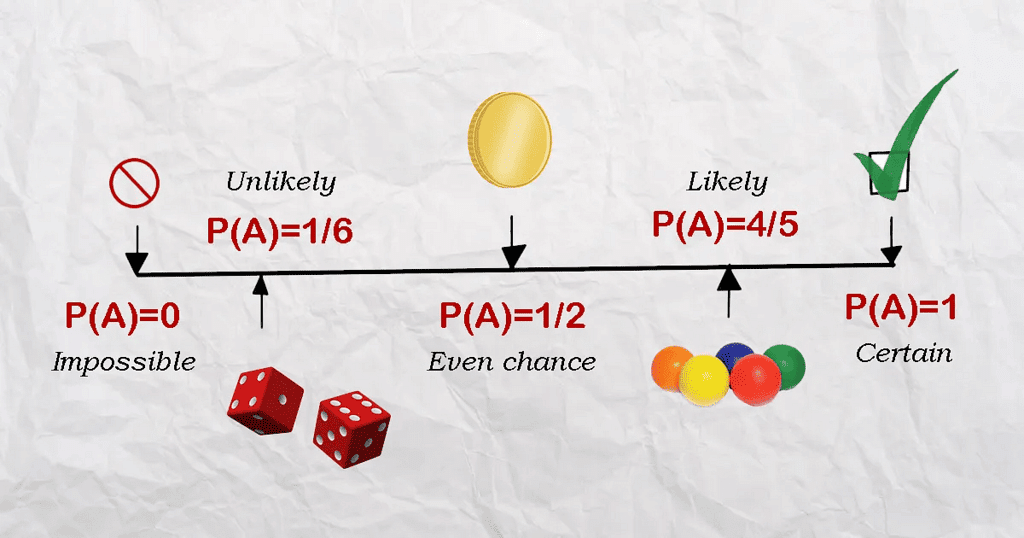
Formula for Probability
- The probability formula is defined as the ratio of the number of favourable outcomes and the total number of outcomes.
- Probability of event to happen P(E) = Number of favourable outcomes/Total Number of outcomes
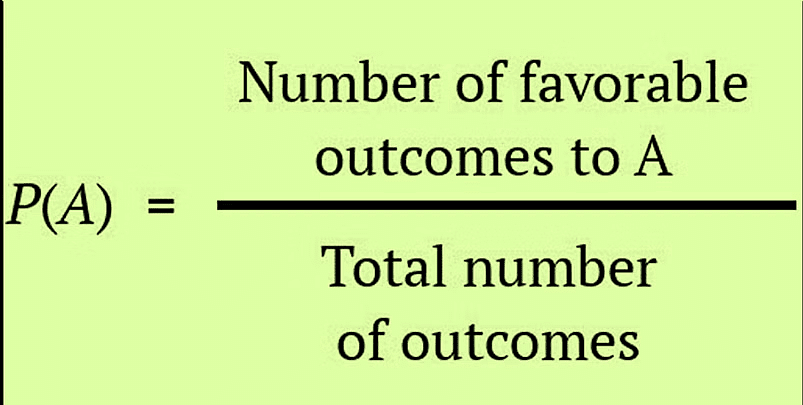
Important Concepts of Probability
| Term | Definition | Example |
| Sample Space | The set of all the possible outcomes to occur in any trial | 1. Tossing a coin, Sample Space (S) = {H,T} 2. Rolling a die, Sample Space (S) = {1,2,3,4,5,6} |
| Sample Point | It is one of the possible results | In a deck of Cards:
|
| Experiment or Trial | A series of actions where the outcomes are always uncertain. | The tossing of a coin, Selecting a card from a deck of cards, throwing a dice. |
| Event | It is a single outcome of an experiment. | Getting a Heads while tossing a coin is an event. |
| Outcome | Possible result of a trial/experiment | T (tail) is a possible outcome when a coin is tossed. |
| Complimentary event | The non-happening events. The complement of an event A is the event, not A (or A’) | In a standard 52-card deck, A = Draw a heart, then A’ = Don’t draw a heart |
| Impossible Event | The event cannot happen | In tossing a coin, impossible to get both head and tail at the same time |
Concept of AND/ OR
Usually, you would encounter two major types of problems in Probability with the use of conjunctions AND and OR.
In general, event definition means breaking up the event into the most basic building blocks, which are commonly through the two English conjunctions— AND and OR.
- ‘AND’ as a binding conjunctive.
Whenever you see AND as the natural conjunction joining two separate parts of the event definition, you can replace the AND by the multiplication (x) sign.
Thus, if E AND R have to occur, and if the probabilities of their occurrence are P(E) and P(R) respectively,
Then the probability that E AND R occur is obtained by connecting P(E) AND P(R).
Replacing the AND with a multiplication sign, you get the required probability as:
Req Probability = P(E) x P(R)
Example. If you have the probability of E hitting a target as 1/2 and that of R hitting the target as 1/5, then the probability that both hit the target if one shot is taken by both of them is?
Sol. The event here is that E hits the target AND R hits the target, both hitting the target.
Hence, the resulting probability is going to be
Probability = P(E) AND P(R) = P(E) x P(R)
Using the values given of P(E) & P(R),
P(E) X P(R) = ½ x ⅕ = 1/10Question for Introduction: ProbabilityTry yourself:In a throw of two dice, find the probability of getting one prime and one composite number.View Solution - 'OR’ as a binding conjunctive
Whenever you see OR as the natural conjunction joining two separate parts of the event definition, you can replace the OR with the addition (+) sign.
Thus, if E OR R have to occur, and if the probability of their occurrence is P(E) and P(R) respectively, then the probability that E OR R occurs is obtained by connecting P(E) OR P(R) i.e., replacing the OR byan addition sign, you get the required probability as:
Example. If you have the probability of E hitting a target as 1/2 and that of R hitting the target as 1/5, then the probability that both hit the target if one shot is taken by either of them is?
Sol. As you can see, whether E OR R hits the target, the outcome is counted even if one of them hits the target.
Hence, the resulting probability is going to be
Probability = P(E) OR P(R) = P(E) + P(R)
Using the values given of P(E) & P(R),
P(E) + P(R) = ½ + ⅕ = 7/10
Unlike the above example, where the event will happen only with both E & R events occurring , here if any one of E, R events can occur. - Combination of ‘AND’ and ‘OR’
You would encounter where in once the event is defined, the probability of each sub event within the broad event is calculated and all the sub events are connected by Multiplication (for AND) or by Addition (for OR) to get the final solution.
Example. If two dice are thrown, what is the chance that the sum of the numbers is not less than 10.
Sol. Event Definition- The sum of the numbers is not less than 10 if it is either 10 OR 11 OR 12.
Which can be done by
P(E) = (6 AND 4) OR (4 AND 6) OR (5 AND 5) OR (6 AND 5) OR (5 AND 6) OR (6 AND 6) that is,
⅙ x ⅙ + ⅙ x ⅙ + ⅙ x ⅙ + ⅙ x ⅙ + ⅙ x ⅙ + ⅙ x ⅙ = 6/36 = ⅙
Hence for the event of sum less than 10, P(E’) = 1 - P(E) = 1 - ⅙ = ⅚
can see that no matter how many broad & sub events the problem of probability is, it can be broken up into its narrower parts, which can be connected by ANDs and ORs to get the event definition.Question for Introduction: ProbabilityTry yourself:In a four game match between Monica and Chandler, the probability that Chandler wins a particular game is 2/5 and that of Monica winning a game is 3/5. Assuming that there is no probability of a draw in an individual game, what is the chance that the match is drawn (Score is 2–2).View Solution
1. Conditional Probability
- The conditional probability, as its name suggests, is the probability of happening an event that is based upon a condition.
- For example, assume that the probability of a boy playing tennis in the evening is 95% (0.95) whereas the probability that he plays given that it is a rainy day is less which is 10% (0.1). Then the former case is just normal probability whereas the latter case is the conditional probability. In this example, we represent the two probabilities as P(Play tennis) = 0.95 and P(Play tennis | Rainy day) = 0.1.
- The conditional probability of event A given that B has occurred is given by P(A/B) = P( A ∩ B)/ P (B), provided P(B) ≠ 0.
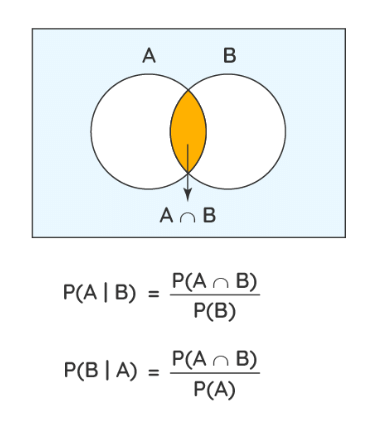 Here:
Here: - P(A | B) = The probability of A given B (or) the probability of A which happens after B
- P(B | A) = The probability of B given A (or) the probability of B which happens after A
- P(A ∩ B) = The probability of happening of both A and B
- P(A) = The probability of A
- P(B) = The probability of B
2. Bayes' Theorem
- Bayes’ theorem describes the probability of occurrence of an event related to any condition. It is also considered for the case of conditional probability.
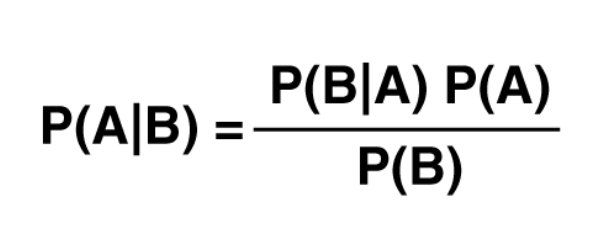
- Example
A man is known to speak the truth 2 out of 3 times. He throws a die and reports that the number obtained is a four. Find the probability that the number obtained is actually a four.
Sol:
Let A be the event that the man reports that number four is obtained.
Let E1 be the event that four is obtained and E2 be its complementary event.
Then, P(E1) = Probability that four occurs = 1/6.
P(E2) = Probability that four does not occur = 1- P(E1) = 1 – (1/6) = 5/6.
Also, P(A|E1)= Probability that man reports four and it is actually a four = 2/3
P(A|E2) = Probability that man reports four and it is not a four = 1/3.
By using Bayes’ theorem, probability that number obtained is actually a four, P(E1|A)

3. Mutually Exclusive Events
- Two or more events are said to be mutually exclusive; these events cannot occur simultaneously. Two or more events are said to be compatible if they can occur simultaneously.
- Two events (A and B) are mutually exclusive if the intersection of the two events is null or they have no common element i.e. A ∩ B = φ.
e.g. In drawing a card from a deck of 52 cards:
A: The event it is red.
B: The event it is black.
C: The event is that it is a king.
In the above case, events A and B are mutually exclusive, but events B and C are not mutually exclusive or disjoint since they may have common outcomes.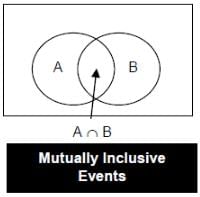
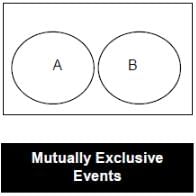
4. Equally likely events:
- If two events have the same probability or chance of occurrence, they are called equally likely events. (In a throw of a dice, the chance of 1 showing on the dice is equal to 2 is equal to 3 is equal to 4 is equal to ,5 is equal to 6 appearing on the dice.)
5. Exhaustive set of events:
- A set of events that includes all the possibilities of the sample space is said to be an exhaus- tive set of events. (e.g. In a throw of a dice the number is less than three or more than or equal to three.)
6. Independent events:
- An event is described as such if the occurrence of an event has no effect on the probability of t76he occurrence of another event. (If the first child of a couple is a boy, there is no effect on the chances of the second child being a boy.)
7. Random Experiment:
- It is the one which gives one or more results under identical conditions. E.g. a coin is tossed.
The set of all possible outcomes of a random experiment is known as the sample space and every outcome is a sample point. - Example. A coin is tossed and a single 6-sided dice is rolled. Find the probability of getting ahead on the coin and a 3 on the dice.
Sol. P(head) = 1/2
P(3) = 1/6
P(head and 3) = 1/2.1/6 = 1/12
8. Sum Rule
- If E and F are two mutually exclusive events, then the probability that either event E or event F will occur in a single trial is given by:
- P(E or F) or P (E ∪ F) = P(E) + P(F)
If the event is not mutually exclusive, then - P(E ∪ F) = P(E) + P(F) – P(E and F together)
Note: P (neither E nor F) = 1 – P(E or F).
9. Complement of an event
- For any event A, there exists another event A‘ which shows the remaining elements of the sample space S. A’ denotes the complementary event of A.
A’ = S – A.
Event A and A’ are mutually exclusive and exhaustive.
Consider the example of tossing a coin. Let P(E) denote the probability of getting a tail when a coin is tossed. Then,
10. Multiplication Rule
When two events, A and B, are independent, the probability of both occurring is:
P(A and B) = P(A ∩ B) = P(A) × P(B)
11. Binomial Distribution
- In binomial probability distribution, the number of ‘Success’ in a sequence of n experiments, where each time a question is asked for yes-no, then the boolean-valued outcome is represented either with success/yes/true/one (probability p) or failure/no/false/zero (probability q = 1 − p).
- A single success/failure test is also called a Bernoulli trial or Bernoulli experiment, and a series of outcomes is called a Bernoulli process.
- For n = 1, i.e. a single experiment, the binomial distribution is a Bernoulli distribution. The binomial distribution is the base for the famous binomial test of statistical importance.
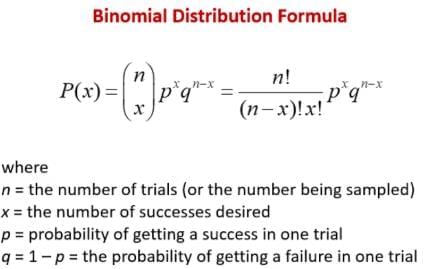
- Example. A dice is tossed 5 times. What is the probability that 5 shows up exactly thrice?
Sol. Here, the 'random experiment' consists of tossing a die 5 times and observing the number '5' as success.
Then p = Probability of getting '5' with a single die = 1/6, so that q = 1-1/6 = 5/6
Since the value of p is constant for each dice and the trials are independent, using the formula for Binomial probability law, the probability of r successes is given by :
Required probability that shows up exactly thrice is given by: Question for Introduction: ProbabilityTry yourself:An unbiased dice is thrown. What is the probability of getting
Question for Introduction: ProbabilityTry yourself:An unbiased dice is thrown. What is the probability of getting
(i) an even number;
(ii) a multiple of 3;
(iii) an even number or a multiple of 3;
(iv) an even number & a multiple of 3?
Choose the most appropriate option.View Solution
Example. Harshad and Amit throw two dice. If Harshad throws 10, what is Amit’s chance of throwing a higher number?
Sol. Total number of outcomes of throwing two dice is 6 × 6 = 36.
Amit must throw either 11 or 12.
This can be done in 3 ways namely (6 + 5, 5 + 6, 6 + 6)
Thus Amit’s chance of throwing a higher number is 3/36 or 1/12.
|
207 videos|267 docs|138 tests
|
FAQs on Introduction: Probability - CSAT Preparation - UPSC
| 1. What is the concept of conditional probability? |  |
| 2. How does Bayes' Theorem relate to probability? |  |
| 3. What are mutually exclusive events in probability? |  |
| 4. What are equally likely events in probability? |  |
| 5. What is meant by an exhaustive set of events in probability? |  |






















